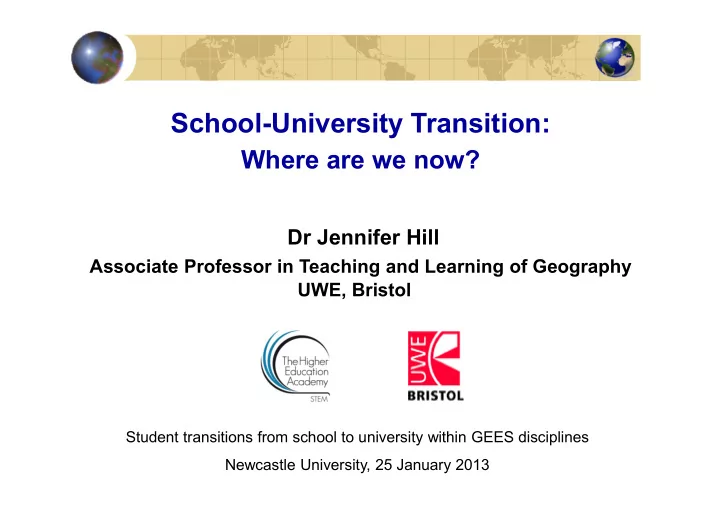

School�University Transition: Where are we now? Dr Jennifer Hill Associate Professor in Teaching and Learning of Geography UWE, Bristol Student transitions from school to university within GEES disciplines Newcastle University, 25 January 2013
Presentation outline 1. Introducing the literature 2. Case study from geography 3. What might the future hold? 4. Questions to consider
1. Introducing the literature • language of a ‘divide’ commonplace in articles examining the nature of the discipline: . ‘decoupled’ (Rawling 1996) . ‘dislocation’ (Kent 2000) . ‘divorce’ (Stannard 2003) • number of recent contributions: . nature/origins of the divide (Castree ����� . 2007) . call for dialogue (Bonnett 2003; Stannard 2003) . bridging the divide (Bednarz ����� . 2000; Yarwood & Davison 2007; Pykett & Smith 2009)
Forces creating the ‘divide’ ������������������ • RAE altered balance between teaching and research (Sidaway & Johnston 2007): . Few research.active university academics submit articles to school.level journals . University geographers rarely input into pre.university curricula • QAA assessments led to inward.looking examinations of pedagogy
�������������� • early Geography National Curricula resulted in KS3 geography that was centrally.controlled, content.heavy, performance.driven • increased demands for accountability through teacher. assessment and reporting levels of attainment Why important? • ‘fossilisation’ of subject in schools C can decrease university recruitment and retention (Castree 2011), and help to isolate geography from the public realm (Ward 2006)
2. Case study from geography Hill & Jones (2010) • examined perceptions of secondary school geography teachers and university lecturers on nature of the divide • identified their perceptions of how closer links can be forged between the two sectors • suggested opportunities for further co.operation and collaboration
Research methods 1. Small scale primary data collection (questionnaire and focus group) undertaken with: . six geography secondary school teachers from across the Bristol region . six geography lecturers from UWE, Bristol: Subject knowledge PL Professor Research Pedagogic knowledge
Results � Perceived nature of the divide • all lecturers and teachers perceived the existence of a divide between school.level and university.level geographies • divisions were identified in relation to the ‘who’, ‘what’, ‘how’ and ‘where’ of geography teaching and learning Who What How Where
Nature of the divide School environment University environment Who is teaching Teacher as ‘jack.of.all.trades’. Lecturer as expert. (teacher/lecturer identity) Research re.active, with breadth Research.active with depth of knowledge of knowledge What is taught Dated and restricted content Current and diverse content (content of courses) imposed by curricula and emanating from a research associated textbooks base How teaching is delivered Restricted to rote learning or Variety of means from cohort (pedagogy) ‘spoon.feeding’ lectures to small group tutorials How students learn Teacher.led Student.led (pedagogy) (dependent/passive) learning. (independent/active) learning. Amassing facts, describing. Critical and theoretical Issues.based. enquiry, exploration and discovery. Process.based. How geography is One view, one ‘right’ answer Multiple views, partial presented representations, numerous (representation) answers Where teaching and Restricted spaces: Varied spaces: lecture learning occurs predominantly classrooms and theatres, classrooms, (educational spaces) field sites computer and environmental laboratories, field sites
���������������� • teachers believed lecturers exercise ownership of their scholarship through research • teachers described themselves generally as disenfranchised from discovery research ����������������������������������������������������� ���������������������������������������������������������� ������������������������������������������������������ ������������� !
��������������� • half the teachers believed university teaching was based on current research • they did not think this permeated to school level: ‘ "������������������������������#��������������������� ������������������������$���%�#��������������������� ���������������������������$��$&��&������������������ ������������������ '!
�������������������������� • different styles of teaching delivery was noted by five of the teachers and all lecturers: ���������������������������������������������������� ����������$����������������������������������������� ��$���&�����������&������������������ ! ������������������� • four lecturers perceived a relative inability of the school system to inculcate deep learning in students: . critical enquiry, numerical analysis, process studies
��������������������������� • ‘how’ teaching and learning takes place was related by the two sample groups to ways of looking at the world • one lecturer noted that school textbooks and teachers: �������������� ��� ���������������������$�������� �������������(����������������������%�)�������������� �������*�����������+��������,������������������������ �����������-!
Results � Activities to connect school�university geographies • all teachers expressed desire to experience closer links with university geography departments • half the academics expressed a clear desire to forge further links with school geography departments • remaining half of academics indicated they would be willing to build stronger links dependent upon: . time (constraints of workload models and curricula) . reward (build into promotion process) . budget (for schools to visit universities)
Current Activities undertaken Future Activities that could be undertaken ��������������� ��������������� Attend GA branch lectures Organise university taster days (for years 9/10 and AS/A2 Attend A.level student conferences levels) Attend school teacher conferences Establish joint fieldwork opportunities Attend widening participation activity days at Establish school curriculum link driven by the university university Assign university student ambassadors (who visit Use departmental newsletters in lessons schools or aid school fieldtrips) Assign university staff ambassadors (who visit schools to teach a particular aspect of geography) �������������������� Use teaching resources provided by university academics (hard copy or via the web) Sit on the local GA committee Establish a buddy/mentor system between school and Deliver GA branch/conference lectures university students Provide A.level student conferences (at university or in schools) Provide widening participation activity days at �������������������� university Increase regular contact with local schools (by pro.active Emphasize the real world relevance of the roadshows or ������� activities) subject Establish a curriculum link driven by the university Contribute to journals read by school students Review provision of school resources on the and teachers (e.g. ������������������ departmental web site and utilise topical web sites for ����������������������������� ) marketing (including social networking sites) Offer CPD activities for teachers Offer outreach activities to students pre A.level Lead field projects in areas local to schools
Recommend
More recommend